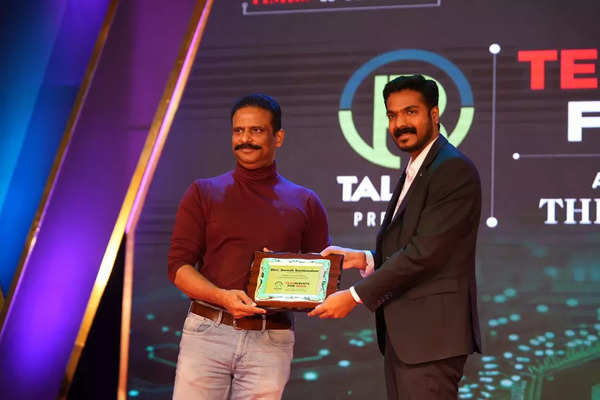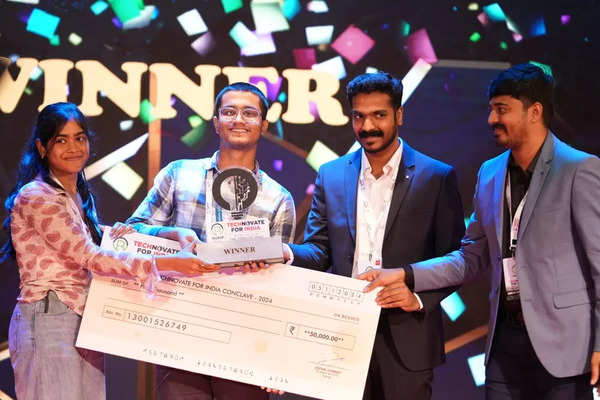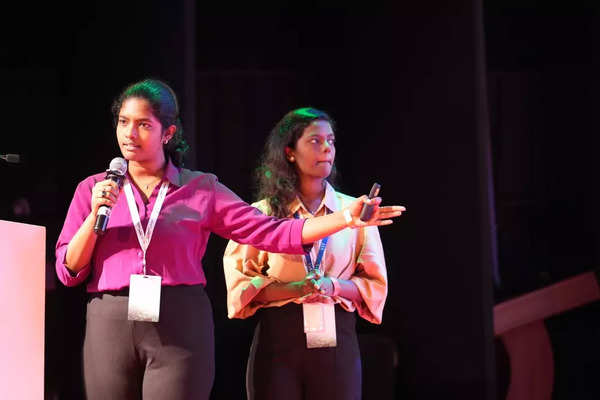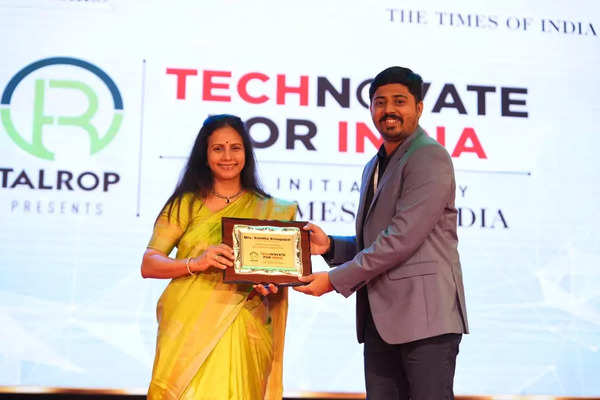For a society aiming to be technologically driven, an aspect India has already made inroads into, it is vital to have a robust ecosystem across the board that helps encourage creativity, supports growth, and, crucially, helps innovators turn their creative ideas into scalable, impactful realities
Partnering with Talrop- an organisation aiming to do precisely that, the inaugural Technovate for India launched in the leading IT hub and engineering powerhouse Chennai. The event spotlighted India’s booming startup ecosystem and its potential to transform the talent-technology landscape.
Industry leaders shared insights on how India is fostering innovation, creating opportunities, and building bridges between talent and industry needs. For a tech-driven future, they stressed the importance of a robust ecosystem that nurtures creativity, supports growth, and translates ideas into scalable solutions. Since 2015, Talrop has been committed to empowering India’s talent pool, creating a bridge to industries that need their ingenuity.

Keynote insights
Vanita Venugopal: CEO, Tamil Nadu Technology Hub
Programmes that have been trialled in this sector have been met with incredible success, in terms of how positively they have impacted not only the confidence of students, but that of investors and industry leaders who will then continue to feed – and build – that growing ecosystem, not just in urban hubs, but in tier-2 and tier-3 cities as well.
Highlighting Chennai’s role as an IT hub contributing 10% of India’s IT services, she outlined plans to further amplify this impact. To nurture deep-tech innovation, she advocated seeing talent as a human asset rather than just commercial value, with governments playing a crucial role in scalability.
She Ms. Venugopal highlighted “disruptive education,” where emerging technologies integrate into a school curriculum. This transformation fills industry skill gaps and establishes technological learning as foundational. She discussed the “Cafeteria Approach,” offering flexible entry into tech learning regardless of one’s educational background, ensures inclusivity.
She also emphasiszed technology as an enabler, not a replacement, urging startups to focus on human interaction and values. Ethical, empathetic innovation, she said, is powerful when “guided by collaboration and collective genius.”
She touched upon the need for all-round support for those looking to transform technology. A system with checks and balances, she says, ensures an ecosystem that works from the ground up.
SPEAKER #2
Kissflow Founder and SaaS Pioneer
Kissflow Founder and SaaS Pioneer Suresh Sambandam emphasised the role of education in Tamil Nadu’s progress. He noted the state’s engineering focus has led to a “job-seeking mindset” but stressed rekindling entrepreneurship among tech graduates. Enhanced access to devices, the internet, and equitable education has propelled the state forward, providing a launchpad for his vision: Tamil Nadu as a trillion-dollar economy.
Central to this vision is fostering startups, not just in major cities but inclusively across districts. By engaging women and promoting MSMEs, Tamil Nadu can leverage its industrial base to innovate sustainable, market-ready solutions.
Addressing Technovate participants, Sambandam underscored the urgency of creating scalable startups from small ideas. “You must build your brands and put your logos on the map,” he said, outlining the path from ideation to funding and scaling, as he indicated to the logos on his screen, bringing them up as examples to aspire to.
A major key to achieving that much-sought-after trillion-dollar economy is attracting industry giants, promoting the MSMEs that already exist within the state’s framework – and the most crucial of all: “We have to build startups.”
In order to truly make a trillion-dollar, business-forward economy, startups cannot be built solely out of key cities. He stresses the importance of building innovation “in an inclusive fashion.” Distributing development will make each district an economic powerhouse in its own right. A focus on inclusive development by engaging districts and actively involving women, he says, fosters ideas that enable people to create impactful products.
He quoted case studies that allowed for Tamil Nadu state’s already existing industrial infrastructure to adapt waste materials into not only raw materials but a finished product that could go to market entirely – an analogy for gestating a strong culture of entrepreneurship among the innovators in Tamil Nadu.
A number of regulations required suppliers from entrepreneurial solutions that exist, but have not yet been scaled up to the level they are needed – thereby setting the stage for the problem statement given to the students participating at Technovate for India Chennai 2024.
Addressing the students at the Chennai conclave, he said, “You are the folks who have to build your brands, and put your logos on the map. His initiative takes startups from the idea stage to funding to scale – making what may seem like – and well, start off as – a small idea, a scalable project.
Problem statement: Bridging the skills gap
Despite thriving sectors like automotives, textiles, electronics, and IT, Tamil Nadu’s graduates face employability challenges due to limited digital proficiency and soft skills. To bridge this gap, targeted guidance is essential.
Technovate participants were tasked with addressing this issue. Teams proposed solutions to enhance graduate employability by focusing on digital skills development and aligning education with industry needs.

Winning solution
The Chennai edition concluded with the SRM Institute of Science and Technology team clinching first place for their innovative platform, SageTree, an AI-driven upskilling tool designed to address employment gaps.

The Team from SRM prefaced their solution with solid data points that really brought home their point. “With 92% of jobs today requiring digital skills and not as many who possess them,” they began, “that is a gap that needs to be breached.”, thus laying the groundwork for their representation
The team highlighted a lack of learning expectations or a clear path for students to follow, and a lack of inclusivity across the board, with English being the lingua franca for digital skills development – thereby preventing a number of grassroots innovators from flourishing.

Online resources for upskilling and learning are abundant but often uncurated, leading to wasted time in finding the right ones. Graduates from non-technical backgrounds face fragmented, impersonal, and language-restricted learning opportunities.
A look at their solutions
SageTree: A Personalised upskilling platform
Team SRM identified a critical issue: one-third of workers lack essential digital skills, hindering their employability in a market where 92% of jobs demand them. SageTree aims to fill this gap by providing:
- AI-generated learning paths: The platform creates personalised AI Trees representing each learner’s journey, curating resources based on their goals.
- Automated resource aggregation: It integrates learning materials from various platforms, saving users time and effort.
- Community support: SageTree fosters collaboration through mentorship marketplaces and group sessions for targeted skill development.
- Gamification: Rewards for skill advancement keep users motivated.
- Language inclusivity: Multi-language support ensures accessibility for grassroots innovators.
SageTree also lists job opportunities in both tech and non-tech sectors, bridging the divide between skills and employment. The platform’s goal is to make upskilling inclusive, impactful, and scalable globally.
The road ahead
Technovate for India’s Chennai edition has laid the foundation for transformative innovation by empowering students to tackle real-world challenges. With events like these, India moves closer to becoming a global hub for technology and innovation, turning its immense talent pool into a driver of change.
Congratulations to Priya, Akrish, and Ritam of SRM Institute of Science and Technology for their visionary contribution to the future of work!
Disclaimer: This article has been produced on behalf of Technovate for India, a collaborative initiative of Talrop and The Times of India, by Times Internet’s team

